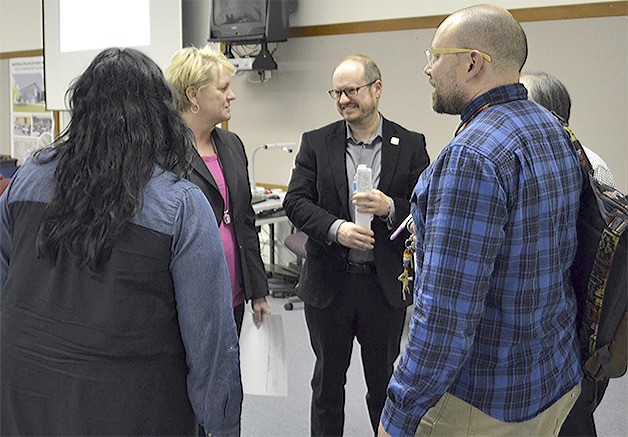MARYSVILLE – They don’t look like Michael Jordan, Magic Johnson, Larry Bird or Charles Barkley.
But Superintendent Becky Berg says they are the Marysville School District’s “Dream Team.”
They are Kyle Kinoshita, Anthony Craig, Chrissy Dulik-Dalos and Jack Monpas-Huber.
At the school board work session Jan. 19 the four talked about their efforts regarding Culture, Equity and Respect in the district.
The goal is to provide hands-on support to close opportunity and achievement gaps. As an example, the reading gap in fourth grade was 22 percent passing for Native Americans compared with 61 percent for Asians.
Kinoshita, executive director of learning and teaching, said they are going more into buildings this year and seeing subtle racism.
“It’s just under the surface,” he said, adding that some people say racism is gone because we have a black president, but that’s not true. “Racial slurs impede student growth,” he said.
Craig, director of cultural competency and school support, said they have looked at each schools equity work and found few minorities in Advanced Placement/Honors courses and more minorities in things like intervention programs.
As for next steps, Kinoshita said teacher microaggressions need to be studied. “They can be small and inadvertent but very damaging,” Kinoshita said.
There also will be an effort to engage with Native American students and their families. That could be challenging, Craig said.
“There’s hundreds of years of history,” he said, “with feelings about boarding schools just as strong today. That can be hard for others to understand.”
It is amazing how little some people know about their next-door neighbors, the Tulalip Tribes, he added. “Some people have never been on that side of the freeway,” Craig said. “That’s somewhat shocking to us.”
In other school board news:
•Members of the SIEU again talked about the need for a contract. They said safety of students should be a concern. Examples included: two workers instead of five supervising playgrounds of up to 200 kids, and the lack of crossing guards at busy intersections such as 47th and Grove. Others said they are on the front lines and need better support if injured on the job.
“Our resources are smaller, but needs bigger,” said Bonnie Krueger, a Marysville-Pilchuck 22-year employee. “There’s no consideration there, and it’s insulting. Were told the money’s gone. Why?”
Diane McCarthy, a 25-year employee, said she’s been involved in negotiations since the 1990s, and these are among the worst.
“You don’t feel appreciated when negotiations drag on this long,” she said. “The safety of the kids is out the door.”
Victoria Grace, another 25-year employee, said workers don’t even make the poverty level of $24,000 a year. “A lot of us don’t even come close,” she said.
•Principal Stephanie Clark and staff talked about improvements at Cedarcrest Middle School. They talked about activities being done to help students bring up scores: homework club, working lunch, Saturday school, before and after school academy, and interventions during P.E. or electives. As a result, more students are at grade level in reading and math. Students are also learning to analyze their work, leading to a deeper level of thinking. “Mistakes are expected, respected and inspected,” Clark said, adding students learn, “I can fix it myself.” As for attendance, the school has identified 32 students who are absent 80 percent of the time and focusing on improving that. On Mondays, staff wears t-shirts supporting, “Respectful, responsible, safe and determined.” “They see it all the time,” Clark said. Students also are asked not only what they have learned but also how it applies to their life. And, parents are learning about computers from their kids.
•Tami Farber and Craig Chambers of the YMCA talked about the Minority Achievers Program. The effort helps minorities and children of poverty level the playing field by getting after-school academic and social-emotional support. The program partners will schools on Common Core standards and reducing summer learning loss. They help participants get college and career ready with activities such as field trips. Farber said they would love to expand into the schools, similar to Advancement Via Individual Determination.
•The school approved a value-engineer study that will save $374,000 on the new cafeteria at Marysville-Pilchuck High School. State funds are paying for the $7.5 million project. “Even though the state is footing the bill we’re still being responsible to the taxpayers,” board president Pete Lundberg said.



